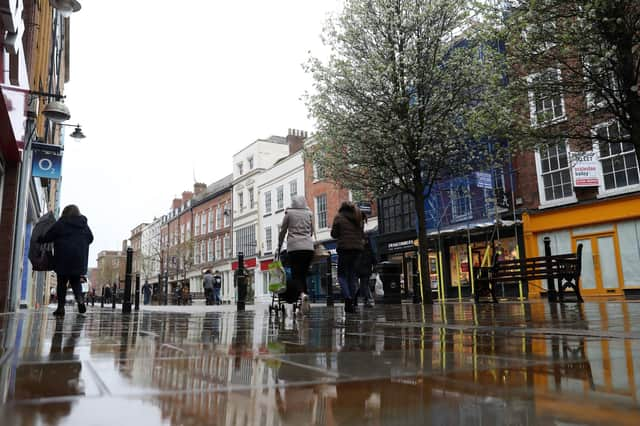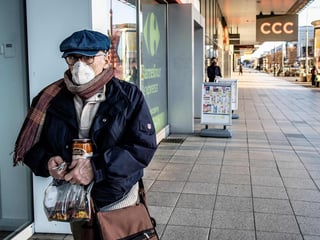Coronavirus panic and fear will pass and hope will return – Bill Jamieson


Just a few weeks ago, we had what seemed a stable, normal world. Today this has been blown apart in the worst global crisis since the Second World War. Virtually all aspects of everyday life have been affected, from the closure of cafes, shops and restaurants to confinement to our homes.
I live in a village that is quiet at the best of times but has become almost totally deserted. This morning I rejoiced when an enterprising bakery business stopped by the village hall and opened van full of breads, rolls and scones. Soon there were people gathering, items being purchased and gossip exchanged. Seldom before has the sound of human voices been more reassuring. At this basic level, life goes on.
Advertisement
Hide AdAdvertisement
Hide AdI have been a business journalist for more than 40 years and cannot recall a time when the fundamentals of everyday life have been so shaken. City squares are empty. Traffic has slumped. The quietness is eerie.
All the things we reported on as ‘important’ and ‘need to know’ just two weeks ago have been swept aside. Priorities for coverage have been upended. A radical budget with £12 billion of emergency measures is found inadequate in under a week. Now the figure has leapt to £350 billion – and with still more to come as the plight of thousands of self-employed workers becomes acute.
To think just a fortnight ago we fretted about fractional movements in GDP and breaching the Government’s fiscal rules! Almost every rule we lived by has been blasted away. And a massive rise in the reach and scale of government will be with us for years. This cycle will turn, as cycles do. But I believe this will have a long-term effect on our thinking about the world and how we live now.
Some specific points. This has been a hundred-decibel-loud wake-up call for the importance of small and medium-sized businesses – long undervalued but a critical employer for millions of people.
In recent years, we have come to think of giant behemoths such as airlines, banks, Google and Amazon as the pillars of our economy. We came to treat SMEs as peripheral.
Look again. They are the real dynamic of our economy and everyday life. Today in Scotland there are more than 360,000 SMEs providing an estimated 1.2 million jobs. The largest sector for SMEs is in ‘professional, scientific & technical activities’ with almost 53,000 businesses, followed by construction with over 45,000 – together these account for 27 per cent of all private sector enterprises in Scotland.
Small firms with small reserves
SMEs also have a stronger presence in rural areas compared to urban locations, accounting for almost 80 per cent of private-sector employment in Orkney compared to 37 per cent in Glasgow. In remote areas, the largest sector for employment is focused on ‘accommodation and food service activities’, showing the role tourism plays in the Highlands and Islands.
Across the UK overall, there were 5.9 million businesses at the start of last year, up by 2.4 million or 69 per cent since 2000. All told, SMEs account for 99.9 per cent of all private sector businesses and more than 16.6 million jobs – 60 per cent of the total. Overall turnover is estimated at £2.2 trillion – 52 per cent of the total.
Advertisement
Hide AdAdvertisement
Hide AdLittle wonder the coronavirus epidemic has wrought havoc. Most of these little firms have the slimmest of reserves, surviving on the smallest of margins. For countless thousands, any interruption of business is a setback – and the consequence of a national lockdown is lethal. Another financial bazooka will be needed to help the self-employed and those on zero-hour contracts.
How all this will be administered by tax offices, local councils and banks pose an enormous problem of logistics, with thousands needed to be drafted in to help in administration. SMEs will also need further help to re-start their business and rebuild their customer base as we come out of the worst of this pandemic.
A recurring pattern
Longer-term, we can expect a quantum leap in resort to the internet and online as the central means of work and communication – and this change will be permanent. As for changes in personal behaviour, one legacy may be far greater care being taken to live a healthier, simpler lifestyle and cut down on resort to the NHS for small, preventable ailments.
Finally, a note of hope: everything moves in cycles. This morning I was sent a graph showing the emotional cycle triggered by shock, unforeseen events. I have not seen such a chart since the great oil crisis and financial slump of 1973-75 when the stock market fell by more than 70 per cent.
The slump in the value of our pensions and savings in times of crisis corresponds to a recurring pattern of emotion: we pass through optimism through euphoria to anxiety, denial, fear, desperation, panic and capitulation. But just when we throw in the towel, come the first signs of recovery – hope, relief, and a return of optimism.
I have seen this cycle recur more times than I care to admit. The coronavirus crisis is likely to prove no different in the fullness of time.
